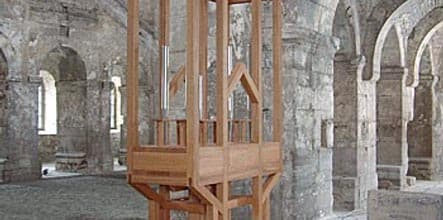Germany's 639-year concert to celebrate 6th chord change

The slowest, longest concert in the world will crawl to its sixth tone change on July 5 in the German town of Halberstadt.
The song is a 639-year-long version of the late avant-garde American composer John Cage's "ORGAN2/ASLSP As Slow aS Possible" that began playing on a specially-made organ at the medieval church of St. Burchardi on September 5, 2001 on the 89th anniversary of his birth.
At 3:33 pm on Saturday, state politicians from Saxony-Anhalt, hordes of tourists and media are expected to attend the chord change to C4-A flat4, which will be accompanied by experimental concerts that will feature the bells of nearby churches.
"The organ has come to represent the city of Halberstadt," head of the John Cage Organ Project, Hans-Jörg Bauer told The Local. "Every year there is more interest."
The project - intentionally staged in the city where the first modern organ keyboard is said to have been built in 1361 - is meant to extend Cage's exploration of how performance and music function within time and space, so the aim is not necessarily about aesthetic enjoyment, Bauer said.
"It's clearly audible from outside the church. Whether it's pretty or not doesn't matter - it's a dissonance," Bauer said, adding that the project had been forced to erect a plastic sound barrier outside the church due to complaints from the neighbors.
The number of tone changes varies each year, Bauer said, but they always occur on the fifth of the month in honor of Cage's birthday. Cage wrote ASLSP in 1985 for the piano, but changed it to an organ piece in 1987. The first performance lasted 29 minutes, and a more recent recording lasts 71 minutes. The current Halberstadt performance, however, is meant to put society's perceptions of time and music to the test.
"The question of how to realize the opus leads to the conclusion that 'as slow as possible' can be thought and played indefinitely," the project's website states. "At least as long as the life of an organ lasts remains and also as long as peace and creativity in the following generations exist."
Comments
See Also
The song is a 639-year-long version of the late avant-garde American composer John Cage's "ORGAN2/ASLSP As Slow aS Possible" that began playing on a specially-made organ at the medieval church of St. Burchardi on September 5, 2001 on the 89th anniversary of his birth.
At 3:33 pm on Saturday, state politicians from Saxony-Anhalt, hordes of tourists and media are expected to attend the chord change to C4-A flat4, which will be accompanied by experimental concerts that will feature the bells of nearby churches.
"The organ has come to represent the city of Halberstadt," head of the John Cage Organ Project, Hans-Jörg Bauer told The Local. "Every year there is more interest."
The project - intentionally staged in the city where the first modern organ keyboard is said to have been built in 1361 - is meant to extend Cage's exploration of how performance and music function within time and space, so the aim is not necessarily about aesthetic enjoyment, Bauer said.
"It's clearly audible from outside the church. Whether it's pretty or not doesn't matter - it's a dissonance," Bauer said, adding that the project had been forced to erect a plastic sound barrier outside the church due to complaints from the neighbors.
The number of tone changes varies each year, Bauer said, but they always occur on the fifth of the month in honor of Cage's birthday. Cage wrote ASLSP in 1985 for the piano, but changed it to an organ piece in 1987. The first performance lasted 29 minutes, and a more recent recording lasts 71 minutes. The current Halberstadt performance, however, is meant to put society's perceptions of time and music to the test.
"The question of how to realize the opus leads to the conclusion that 'as slow as possible' can be thought and played indefinitely," the project's website states. "At least as long as the life of an organ lasts remains and also as long as peace and creativity in the following generations exist."
Join the conversation in our comments section below. Share your own views and experience and if you have a question or suggestion for our journalists then email us at [email protected].
Please keep comments civil, constructive and on topic – and make sure to read our terms of use before getting involved.
Please log in here to leave a comment.